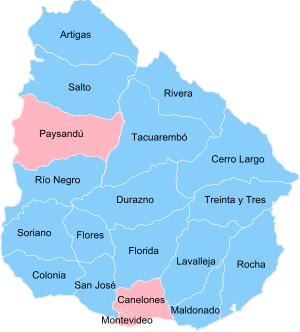Our website is made possible by displaying online advertisements to our visitors.
Please consider supporting us by disabling your ad blocker.
2022 Uruguayan Law of Urgent Consideration referendum
You can help expand this article with text translated from the corresponding article in Spanish. (March 2022) Click [show] for important translation instructions.
|
| |||||||||||||||||||||||||
Referendum appeal against 135 articles of Law No. 19,889 of 9 July 2020 | |||||||||||||||||||||||||
| Outcome | Repeal rejected | ||||||||||||||||||||||||
|---|---|---|---|---|---|---|---|---|---|---|---|---|---|---|---|---|---|---|---|---|---|---|---|---|---|
| Results | |||||||||||||||||||||||||
| |||||||||||||||||||||||||
 Results by department: Yes No | |||||||||||||||||||||||||
A referendum on the Urgent Consideration Law was held in Uruguay to ask the electorate if 135 articles of Law 19,889 (known as the "Urgent Consideration Law", "Urgency Law" or simply "LUC") – approved by the General Assembly in 2020 and considered as the main legislative initiative of the coalition government of President Luis Lacalle Pou — should be repealed.[1][2] It was the result of a campaign promoted by various social and political actors such as the national trade union center PIT-CNT and the opposition party Broad Front. On 8 July 2021, almost 800,000 adhesions were delivered to the Electoral Court, exceeding 25% of the total number of registered voters who are constitutionally required to file a referendum appeal against a law.[3][4]
Article 168 of the Uruguayan Constitution establishes that the Executive Branch may submit bills to the General Assembly declaring them "of urgent consideration". In this case, the House that receives the bill in the first instance has a period of 45 days to put it into consideration; if the term expires without the bill being rejected, it is considered approved in its original form and is communicated to the other House, which has a term of 30 days, and in case of approving a bill with modifications, it must re-enter the first House where it will have another 15 days for consideration. If after this period there is no express statement that demonstrates common agreement between the houses regarding the modifications, the bill is sent to the General Assembly, which will have 10 days to consider it.[5] With this constitutional mechanism, if a bill does not receive parliamentary approval within the stipulated periods, it automatically becomes law in the form in which it was sent by the Executive Power.[6]
Since the transition to democracy in 1985, only 13 bills were sent to Parliament with a declaration of "urgent consideration" (0.003% of the total bills sent by the Executive in that period), of which 9 were approved and 4 were rejected.[7] All governments applied the mechanism, except for the second terms of Julio María Sanguinetti and Tabaré Vázquez. However, in most of these cases urgent consideration was used for specific topics and only 3 bill fall into the category of “Omnibus bill”, based on the number of topics covered.[7]
For the repeal to happen, the total of yes votes had to reach the absolute majority of valid votes, which included blank ones.[8] It thus failed, only 48.67 % of the total votes including blank ones being for the repeal.
- ^ "LUC referendum in Uruguay scheduled for March 27". MercoPress. Retrieved 11 March 2022.
- ^ de 2020, 8 de Julio. "El Congreso uruguayo aprobó la Ley de Urgente Consideración, clave para el gobierno de Lacalle Pou". infobae (in European Spanish). Retrieved 19 March 2022.
{{cite web}}: CS1 maint: numeric names: authors list (link) - ^ ElPais. "Comisión Pro Referéndum entregó 797.261 firmas a la Corte Electoral". Diario EL PAIS Uruguay (in Spanish). Retrieved 19 March 2022.
- ^ "Constitución de la República Oriental del Uruguay". www.impo.com.uy. Retrieved 19 March 2022.
- ^ "Constitución de la República Oriental del Uruguay". www.impo.com.uy. Retrieved 19 March 2022.
- ^ diaria, la (21 January 2020). "¿Qué es una ley de urgencia, cuáles son los plazos de su tratamiento parlamentario y quién ha utilizado la herramienta?". la diaria (in Spanish). Retrieved 19 March 2022.
- ^ a b Chasquetti, Daniel (30 September 2019). "Los proyectos de ley de urgente consideración en Uruguay". Programa de Estudios Parlamentarios (in Spanish). Retrieved 19 March 2022.
- ^ What is the Law of Urgent Consideration of Lacalle Pou that Uruguayans ratified in the referendum
Previous Page Next Page


